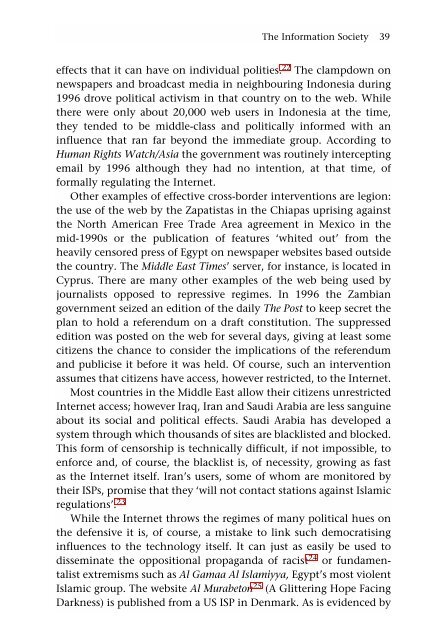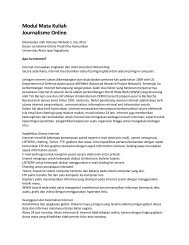Online Journalism - Ayo Menulis FISIP UAJY
Online Journalism - Ayo Menulis FISIP UAJY
Online Journalism - Ayo Menulis FISIP UAJY
You also want an ePaper? Increase the reach of your titles
YUMPU automatically turns print PDFs into web optimized ePapers that Google loves.
The Information Society 39<br />
effects that it can have on individual polities. 22 The clampdown on<br />
newspapers and broadcast media in neighbouring Indonesia during<br />
1996 drove political activism in that country on to the web. While<br />
there were only about 20,000 web users in Indonesia at the time,<br />
they tended to be middle-class and politically informed with an<br />
influence that ran far beyond the immediate group. According to<br />
Human Rights Watch/Asia the government was routinely intercepting<br />
email by 1996 although they had no intention, at that time, of<br />
formally regulating the Internet.<br />
Other examples of effective cross-border interventions are legion:<br />
the use of the web by the Zapatistas in the Chiapas uprising against<br />
the North American Free Trade Area agreement in Mexico in the<br />
mid-1990s or the publication of features ‘whited out’ from the<br />
heavily censored press of Egypt on newspaper websites based outside<br />
the country. The Middle East Times’ server, for instance, is located in<br />
Cyprus. There are many other examples of the web being used by<br />
journalists opposed to repressive regimes. In 1996 the Zambian<br />
government seized an edition of the daily The Post to keep secret the<br />
plan to hold a referendum on a draft constitution. The suppressed<br />
edition was posted on the web for several days, giving at least some<br />
citizens the chance to consider the implications of the referendum<br />
and publicise it before it was held. Of course, such an intervention<br />
assumes that citizens have access, however restricted, to the Internet.<br />
Most countries in the Middle East allow their citizens unrestricted<br />
Internet access; however Iraq, Iran and Saudi Arabia are less sanguine<br />
about its social and political effects. Saudi Arabia has developed a<br />
system through which thousands of sites are blacklisted and blocked.<br />
This form of censorship is technically difficult, if not impossible, to<br />
enforce and, of course, the blacklist is, of necessity, growing as fast<br />
as the Internet itself. Iran’s users, some of whom are monitored by<br />
their ISPs, promise that they ‘will not contact stations against Islamic<br />
regulations’. 23<br />
While the Internet throws the regimes of many political hues on<br />
the defensive it is, of course, a mistake to link such democratising<br />
influences to the technology itself. It can just as easily be used to<br />
disseminate the oppositional propaganda of racist 24 or fundamentalist<br />
extremisms such as Al Gamaa Al Islamiyya, Egypt’s most violent<br />
Islamic group. The website Al Murabeton 25 (A Glittering Hope Facing<br />
Darkness) is published from a US ISP in Denmark. As is evidenced by
















